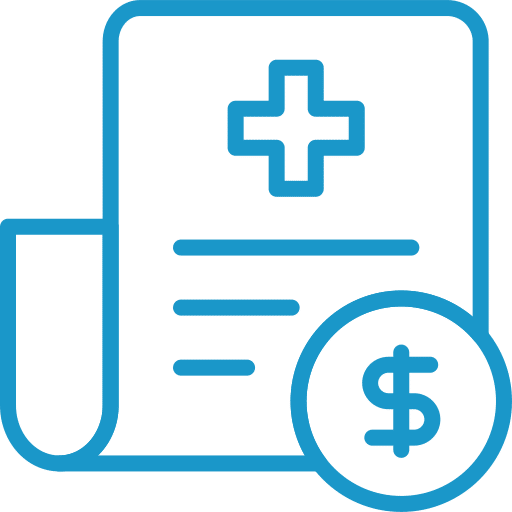Best Personal Medical Loans
Get pre-qualified for a medical personal loan in just minutes. Checking rates won’t affect your credit score







How to get a loan for medical procedures
Whether you’re for the US healthcare system or against it, there’s no denying that a medical emergency can come with the added stress of worrying about how you’re going to pay for your treatment. While having health insurance can certainly help you manage these expenses, it’s not a guarantee that there won’t be anything to pay.
Your financial situation should never be a barrier to getting quality health care, and so a medical loan can be there to help you make the costs more affordable.
Applying for medical financing is fast and easy:
Compare personal loan rates
Compare personal loan rates in July, 2025
What are medical loans?
A medical loan is a type of personal loan specifically designed to cover medical expenses. It is a financial product that helps individuals pay for medical treatments, procedures, surgeries, medications, or any other healthcare-related costs. Medical loans are offered by various financial institutions, such as banks, credit unions, and online lenders. Borrowers can typically choose the loan amount, repayment term, and interest rate based on their needs and financial situation. The loan funds are disbursed directly to the borrower, who can then use the money to pay for their medical expenses. Repayment is made through regular monthly installments over a specified period of time. Medical loans provide individuals with a financing option to manage their healthcare expenses and allow them to receive the necessary medical care without delay.
How does a medical loan work?
A medical loan, also known as medical financing, works as follows:
- Application: Apply for a medical loan by providing necessary information and stating the purpose as medical expenses.
- Approval and Terms: If approved, you receive loan terms, including the amount, interest rate, and repayment period.
- Disbursement: The loan funds are disbursed to you, either as a lump sum or directly to the medical provider.
- Use of Funds: Utilize the funds to pay for medical expenses, such as treatments, surgeries, medications, or hospital bills.
- Repayment: Start making regular monthly payments, including principal and interest, based on the agreed-upon terms.
- Interest Rates and Fees: Consider the interest rate and any applicable fees associated with the loan.
- Creditworthiness: Your creditworthiness is evaluated during the application process, impacting the loan terms.
What are the pros and cons of medical loans?
PROS
- You can seek medical care confidently if you haven’t yet due to financial concerns
- Repayment terms are often long
- Loans are funded quickly – often same-day
- Some are flexible, so you can use the money for any expenses during your recovery
CONS
- Interest rates for those who have struggled in the past (and so have a poor credit rating) is high – up to 35% and sometimes even more
- Some charge additional fees that make them take longer to repay
- You may not be able to borrow enough to pay the full amount of your bills
What can a medical loan be used for?
You can use medical financing for both necessary and elective treatment, such as:
- Cosmetic surgery (e.g., breast augmentation, liposuction, facelift)
- Fertility treatments (e.g., in vitro fertilization, egg freezing)
- Dental procedures (e.g., dental implants, orthodontic treatments)
- LASIK eye surgery (laser vision correction)
- Hair transplant surgery
- Bariatric surgery (weight loss surgery)
- Plastic surgery (e.g., tummy tuck, rhinoplasty, breast reduction)
- Dermatological procedures (e.g., acne scar removal, laser skin resurfacing)
- Allergy testing and treatment
- Orthopedic surgeries (e.g., joint replacement, ACL reconstruction)
- Varicose vein treatments
- Mental health treatments (e.g., therapy, counseling, psychiatric evaluations)
- Alternative medicine treatments (e.g., acupuncture, chiropractic care, naturopathy)
Quick links

Ready to apply for a medical personal loan? Get started today.
Need help finding the right loan?
No worries, we've got you covered! Compare personalized loan options in just minutes.
How Pasha Funding Works

Alternatives to medical loans
You may find that a medical loan doesn’t suit your circumstances. Here are some other options that may be a better fit for you:
- Credit cards: if your bill is relatively small, a credit card can be a great way to spread the cost, especially if you have good or excellent credit and so can get a long 0% APR period. Just be aware that interest rates can be as high as medical loans after this period, or for anyone who can’t get a 0% APR card.
- HSA or FSA: Health savings accounts and flexible spending accounts are sometimes available through your employer or health insurance provider so you can pay off outstanding medical bills. When you use these services to pay for your medical bills, you will often get a discount.
- 401(k) loan: You can take a loan from yourself out of your 401(k), provided you don’t want to use your 401(k) within the next 5 years (or you may be penalized). These loans are limited to $50,000 and have a 5-year repayment period.
- Payment plans: Many medical providers provide payment plans for essential treatment, and some for non-essential treatment, so ask your medical provide what is available to you. Some providers will require a down-payment followed by monthly payments, while others will set up a monthly payment plan for you. Make sure you’re aware of any interest rates and additional fees before you agree to your plan.
- HELOC: A home equity line of credit (HELOC) allows you to open a line of credit secured against your home. This works much like a credit card, where credit becomes available to you again once you’ve paid it off, so can be a good option if you’re not sure yet the total cost of your care. These usually have lower interest rates and offer more credit than other options, but you may have your home taken from you if you don’t keep up your repayments.
- Friends, family, & crowdfunding: Don’t be afraid to turn to friends and family if you’re in a tight spot and need—or have had—essential care. They may be willing to help you pay off or manage the costs of your debt. Crowdfunding is another good option, and sites like GoFundMe will allow you to share your story and allow friends and well-wishers to anonymously donate to help you pay your bills.
- Consider financial assistance: if you are going to struggle to meet your repayments, there is no shame in asking for help and we would encourage you to look into free and low-cost healthcare options available to you. There are many financial aid programs offered by hospitals to ensure you get the care you need. You often need to meet certain criteria to qualify, but don’t write yourself off before you apply.
Medical loan payment calculator
Total Payment
-
Total Interest
-
Monthly Payment
-
Ready to apply for a personal loan?
Compare rates from top lenders with no impact on your credit, ever.
Can I get my medical bills reduced?
In some cases, you can get your medical bills reduced, so it’s always worth seeing what you can do before you get a payment plan in place. Here are some options:
- Negotiate a lower payment: It’s easy to feel like a victim when you cannot afford large medical bills, but remember that you’re not powerless. Try talking to your hospital if you don’t qualify for financial aid and tell them about your financial situation to see if they can reduce your bill.
- Ask about a discount if you’re uninsured: Some hospitals will discount their rate if you are uninsured to make it more affordable, so make sure you ask if they offer any reductions for uninsured people.
- If you have almost enough to pay, offer to pay it off in one: This option certainly isn’t for everyone, but if you have the cash to pay almost the entire bill, talk to your hospital to see if they’re waive the remaining amount if you pay it off now, or if they can help you with a payment plan for the remaining amount.
- Dispute high rates and inaccuracies: It’s easy to panic when you get your medical bill, but once you’ve gotten over the shock, sit down and find out what everything on your bill should cost and if it seems high, question them on it. There are also stories out there of people asking for an itemized bill and suddenly finding their bill reduced drastically, so if your bill isn’t broken down, ask them to give you an itemized bill.
What credit score do I need to apply for medical financing?
You will be able to find some form of medical financing for any credit score, but if you’re struggling financially, make sure you investigate ways to reduce the bill, low-income programs, and crowdfunding before you start looking to borrow.
That said, most lenders will look for a credit score of 600 or more for good interest rates, and any score below that will likely have a high interest rate.
What is the average medical loan interest rate?
The average medical loan interest rate can vary depending on several factors, including the borrower's creditworthiness, the loan amount, the repayment term, and the lender's policies. It is important to note that interest rates are subject to change over time and can vary among lenders. To get an accurate understanding of the current average interest rates for medical loans, it is best to consult with lenders or financial institutions that offer medical financing options. They can provide you with specific information based on your financial situation and the loan terms you are seeking.
How can I qualify for medical financing?
To qualify for medical financing, follow these steps:
- Check your credit: Lenders assess creditworthiness, so aim for a higher score before applying.
- Research lenders: Look for those specializing in medical expenses or offering healthcare financing.
- Gather documents: Prepare proof of income, bank statements, and identification.
- Assess requirements: Review eligibility criteria, including credit score, income, and residency.
- Complete the application: Fill it out accurately, providing details on medical expenses.
- Review loan terms: Carefully examine interest rates, repayment period, and fees.
- Accept the offer: If satisfied, sign the loan agreement.
Remember, meeting requirements doesn't guarantee approval. Compare lenders, select the best fit, and get the medical financing you need.
Personal Loans for Every Occasion
Find Your Best Rate
Compare Best Personal Loans
Personal Loan Payoff Calculator
Personal Loan Lender Reviews
Personal Loans By Credit
Personal Loans for Fair Credit
Personal Loans for Good Credit
Personal Loans for Excellent Credit
Personal Loan Types
Auto Repair Loans
Credit Card Consolidation Loans
Fast Personal Loans
Home Improvement Loans
Horse Barn Financing
Wedding Loans
Family Planning Loans
Funeral Financing
Land Purchase Financing
Manufactured Home Financing
Medical Loans
Cosmetic & Plastic Surgery Financing
Owner Builder Construction Loans
Personal Loans for House Down Payment
Personal Loans for Self Employed
Personal Loans for Furniture Expenses
Student Loans
Debt Consolidation Loans
Vacation & Travel Loans
Emergency Personal Loans
Personal Loans with Co-signers
Home Improvement Financing
Appliance Financing
Bathroom Remodel Financing
Basement Remodel Financing
Boat Dock Loans
Deck Financing
Driveway Paving Financing
Fence Financing
Flooring Financing
Furnace Financing
Garage Financing
Home Addition Financing
Hot Tub Financing
HVAC Financing
Home Insulation Financing
Interior & Exterior Painting Financing
Kitchen Remodel Financing
Kitchen Cabinet Financing
Pole Barn Financing
Roof Financing
Solar Panel Financing
Swimming Pool Financing
Sunroom Addition Loans
Window Replacement Financing
Loan rate & terms disclosure: Prequalified rates are based on the information you provide and a soft credit inquiry. Receiving prequalified rates does not guarantee that the Lender will extend you an offer of credit. You are not yet approved for a loan or a specific rate. All credit decisions, including loan approval, if any, are determined by Lenders, in their sole discretion. Rates and terms are subject to change without notice. Rates from Lenders may differ from prequalified rates due to factors which may include, but are not limited to: (i) changes in your personal credit circumstances; (ii) additional information in your hard credit pull and/or additional information you provide (or are unable to provide) to the Lender during the underwriting process; and/or (iii) changes in APRs (e.g., an increase in the rate index between the time of prequalification and the time of application or loan closing. (Or, if the loan option is a variable rate loan, then the interest rate index used to set the APR is subject to increases or decreases at any time). Lenders reserve the right to change or withdraw the prequalified rates at any time.
Requesting prequalified rates on Credible is free and doesn't affect your credit score. However, applying for or closing a loan will involve a hard credit pull that impacts your credit score and closing a loan will result in costs to you.









